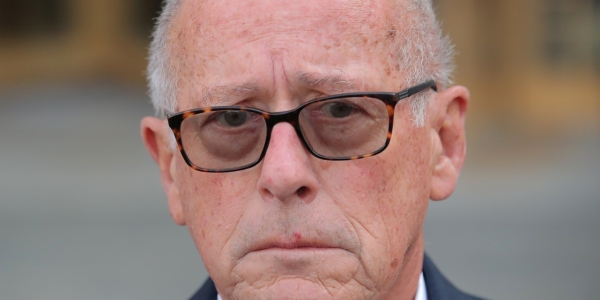
The former head of a major generic-drug distributor was sentenced in New York to 2 1/4 years in prison for conspiring to sell opioids to crooked pharmacies to boost profits and his own pay.
“This was a crime that was motivated solely by profit,” US District Judge George Daniels said at Laurence F. Doud III’s sentencing hearing in Manhattan federal court on Wednesday.
Doud, 79, spent 25 years as chief executive officer of Rochester Drug Co-operative. He was found guilty last year in what prosecutors called a “first-of-its-kind” prosecution for selling addictive opioids to pharmacies that were suspected of dispensing them to addicts and street dealers. He faced the possibility of spending the rest of his life in prison.
Jurors in New York found Doud guilty in February 2022 of orchestrating a scheme at the company to sell large amounts of addictive oxycodone and fentanyl to businesses despite “red flags” that included unusual sales volumes, a high proportion of cash purchases, buyers traveling from out of state to buy from suspected drugstores, and prescriptions from doctors on opioid watch lists.
Daniels chose a sentence on the lenient end of guidelines that, according to prosecutors, called for Doud to get 30 years to life in prison. The government instead asked Daniels to give him 15 years. But the judge ruled prosecutors had failed to show the amount of opioids from Doud’s company that were actually diverted to illegal use. He agreed with Doud’s team that the guidelines were actually just 27 to 33 months and gave him the lower end of that range.
Doud’s lawyer asked for no prison time, arguing that any substantial prison time would amount to a life sentence for the retired executive.
In addition to the time behind bars, Doud must pay a fine of $100,000 and serve three years’ probation after he’s released. Daniels ruled Doud can remain free on bail while he appeals his conviction.
‘Monumental Travesty’
Doud was convicted of conspiracy to distribute controlled substances and conspiring to defraud the US government by failing to report suspicious orders to the Drug Enforcement Administration. He derived $500,000 in bonuses from RDC’s sales of opioids in the five years before he was set to retire, according to the government. The jury delivered its unanimous verdict on the second day of deliberations.
At the time of Doud’s conviction, his lawyer, Robert Gottlieb, called the verdict “a monumental travesty of justice.” In court papers Doud’s team argued that compliance failures at drug distributors have never given rise to criminal charges, but have been handled through civil enforcement by regulators.
“There is nothing typical about the sentencing in this particular matter and the aspects of the charged conduct for which the jury voted to convict is currently under substantial debate,” Doud’s lawyers said in a court filing.
Doud’s team also said that his advanced age and health problems supported his request to stay out of prison.
‘Shattering Impact’
During the trial, Doud’s lawyers argued he wasn’t responsible for failing to stop illegal opioid sales and that there was no agreement among Doud and his employees to distribute drugs illegally. The company hired outside consultants, including a former DEA agent, to look into RDC’s compliance, they said.
Prosecutors argued that Doud disregarded strict laws making it illegal to sell the drugs without controls preventing them from being diverted to illegal uses, and ignored the red flags.
In court papers, prosecutors said Doud was motivated by “greed and his company’s bottom line” to sell addictive drugs to pharmacies that were diverting them to addicts. Arguing to send him to prison, possibly for the rest of his life, they called him a “white-collar drug dealer” and pointed to the “shattering impact” the scheme had on people suffering from addiction.
William Pietruszewski, RDC’s former chief compliance officer, testified at the trial that Doud knew that many of the drugs being shipped were illegally diverted. Pietruszewski pleaded guilty to his role in the scheme in 2019 and agreed to cooperate with prosecutors.
RDC, which was formed in 1905, was once the sixth-largest pharmaceutical distributor in the US. It agreed to pay $20 million to resolve narcotic conspiracy charges on the same day that Doud surrendered to authorities. The company filed for bankruptcy in March 2020, listing assets of more than $50 million and debt of more than $100 million.
“I want you to know that nothing I ever did was done with malice,” Doud told the judge. “I never wanted to see anybody hurt.”
But the former executive said he was responsible for all areas of the business.
“I realize what a lousy job I did” in managing compliance with rules restricting opioid sales to suspect pharmacies, he said.
The case is US v. Doud, 19-cr-00285, US District Court, Southern District of New York (Manhattan).




